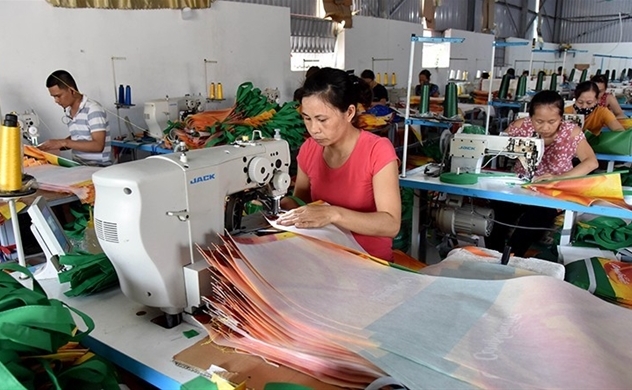Creating momentum for the private economy to develop

Sewing bags for export at Huyen Binh Company, Nam Dinh Province. Photo by Lam Thanh.
However, to help the private economy to develop sustainably, the Party and State need to have more guidelines and policies to support and facilitate the business environment, and access to resources, and create momentum for the private economy to develop in the long term, in a fair and transparent environment.
Important role
When conducting the Doi Moi (Renewal) in 1986, the Party and State determined to develop a multi-sector economy, paving the way to allow the private economy to operate freely.
The Doi Moi created a turning point in the development history of the Vietnamese economy, thereby setting forth many important undertakings, policies and prerequisites, for the development of the private economy and Vietnamese entrepreneurs.
Thanks to innovative thinking, from an inferior and tied position, the private economic force has brought the Vietnamese economy out of the brink of crisis, putting it on a new development trajectory, with an open market, access, integration and international competition. Up to now, the private economy in Vietnam has made strong progress.
In the 2010-2017 period, an average of more than 100,000 new enterprises were established each year, and in the 2018-2022 period, each year, more than 130,000 new enterprises were established. Correspondingly, the annual registered capital reached millions of billions of dong, especially in the 2018-2022 period, each year, the private economy contributed an average of 2 quadrillion VND of newly registered capital to the economy.
With about 800,000 businesses in operation, the private sector is contributing nearly 45% of the country's GDP, one-third of state budget revenue, and more than 40% of investment capital realised in the whole society, creating jobs for 85% of the country’s labour force.
In addition, the private sector has played an important role in Vietnam's international trade, accounting for 35% of total imports and 25% of total exports. Capital from the private sector makes a great contribution to socio-economic development, increasing from 51.3% in 2016 to 59.5% in 2021.
Although many encouraging achievements have been obtained, according to Dr. Can Van Luc, an economic expert, it is clear that the performance of the domestic private sector has not improved with multifaceted limitations, not ready to become an important driving force of the economy.
Among 800,000 operating enterprises, the number of large enterprises (mainly state-owned enterprises) accounts for only about 2%, medium enterprises also account for 2%, and the remaining 96% are small and micro enterprises, with the majority still being household businesses (accounting for 94%).
Therefore, the level of technology, management, financial capacity, product quality and competitiveness of these enterprises are still low, the industry structure is unreasonable, lack of links with each other and with other economic sectors.
Although the private sector is large in quantity, its quality is still limited. In terms of sustainable development, there are still many problems, especially those related to social and environmental responsibility.
Not sustainable
After the COVID-19 pandemic, most of the private enterprises in Vietnam faced numerous difficulties, causing the growth rate to slow down. In the 2020-2021 period, each year, there were about 120,000-140,000 newly established enterprises, but the rate of enterprises being dissolved or ceased to operate also accounts for 60%.
According to recently announced data from the General Statistics Office (the Ministry of Planning and Investment), in the first five months of 2023, about 88,000 businesses withdrew from the market, up 22.6% over the same period in 2022; an average of 17,600 businesses withdrew from the market each month.
Compared to more than 61,900 newly registered businesses, the higher number of businesses leaving the market has shown that the "endurance" of businesses is reaching its limit.
The development of the private economy is still facing many challenges when the number of businesses increased rapidly, especially newly established enterprises, but the proportion of enterprises “leaving” the market is not small, accounting for about two-thirds of new business start-ups. The quality and performance of enterprises in this area have been slow to improve, most of them still operating in the field of trade and services.
In particular, the level of the private sector is still limited, as there is a lack of capacity for innovation and the development of new technologies and production processes.
The labour productivity growth rate of the private sector is still low, equal to only 34% of the labour productivity of state-owned enterprises and about 69% of the labour productivity of FDI enterprises.
According to the Chairman of the Vietnam Chamber of Commerce and Industry (VCCI) Pham Tan Cong, although the Government has had many directions, mechanisms and policies to support, and determination to promote development in the past time, however, specific actions, policies and effective implementation towards creating more favourable conditions for businesses are still very slow.
Although the goal of having 1.5 million enterprises by 2025 and beyond 2 million enterprises by 2023 has shown the Government's desire and determination in developing the private economic force and improving the business environment, as well as stimulate the spirit of entrepreneurship, it will not be easy to achieve without more efforts to reform and effectively support, helping to “elevate” the position of the private sector in the national economy.
Source: Nhân Dân

 TIẾNG VIỆT
TIẾNG VIỆT 










_131447820.png)







